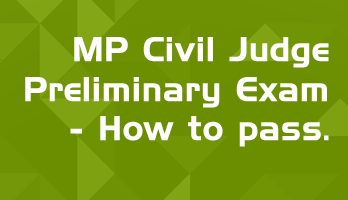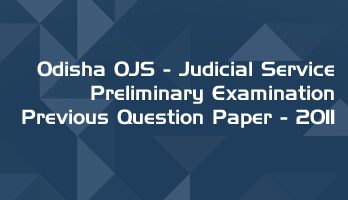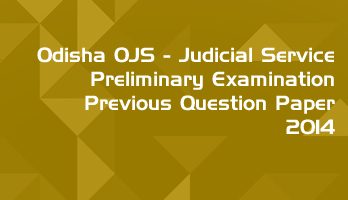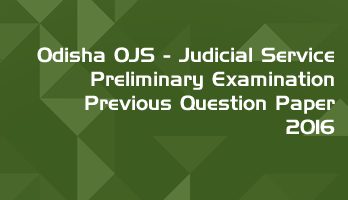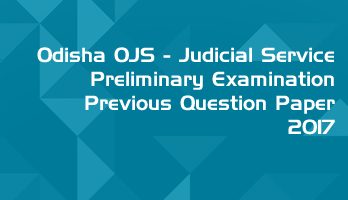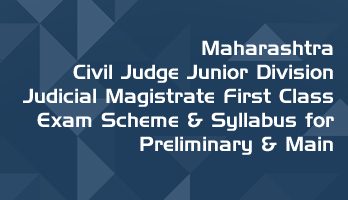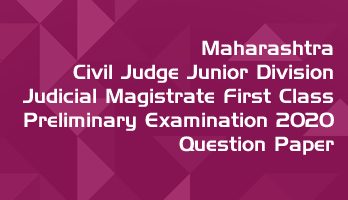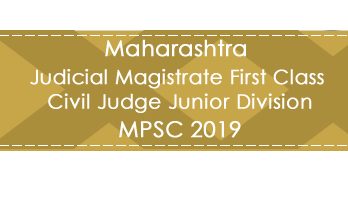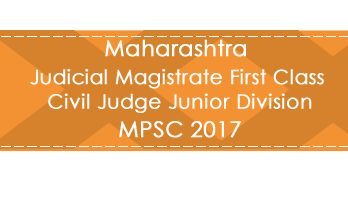We are shortly launching our Online Practice Packs for various State Judicial (Judge) Exams.
We will notify you as soon as we release the Practice Packs. Enter your name & email in the form below.
Note : This is not the complete question paper. This post contains only the question headers for reference. The complete papers, with the official answer keys are available for our registered users of LawMint.com online practice packs for the Judicial Services Exam preparation.
# The Directive Principles of State Policy as embodied in Chapter IV of the Constitution were derived by us from –
# State which of the following statements is correct:
# State which of the following statements is correct – –
# The right to equality means that no person is above law. To this rule, certain exceptions are recognized. State which of the following come under the exception:
# Which one of the following writs can be issued only against the judicial or quasi-judicial authorities?
# State which of the following statements is incorrect:
# The Directive Principles are –
# Which of the following has been withdrawn by RBI in 2011:
# The total number of Ministers, including the Prime Minister in the Council of Minister should not exceed – ¬
# Who has been conferred with Rajiv Gandhi Khel Ratna Award in the year 2011.
# Vast powers and functions vested in the Indian President make him:
# Only that person can be appointed a judge of the Supreme Court who is a citizen of India and:
# While a proclamation of emergency is in operation the State Government –
# What cannot be done directly cannot be done indirectly’. This statement epitomises, the doctrine of –
# Residuary powers are vested in:
# Who said that the Supreme Court in India has the highest powers which no other Court in the world possess?
# The Constitution of India is –
# Who amongst the following is not a ‘public officer’ within the meaning of Section 2 (17) of C.P.C.
# Give response to the statement Equality before law under Article 14 of the Constitution is with reference to
# A change of nature of obligation of a contract is known as
# Indira Swahney v..Union of India is a case popularly known as:
# The Advisory opinion tendered by the Supreme Court:
# Among the following States, which one sends the highest number of members to Lok Sabha?
# A contract, which is formed without the free consent of the parties, is
# Which of the following legal pleas need not be pleaded
# At present the Vice President of India is –
# The smallest military outfit is called a
# India’s largest’and most sophisticated indigenously built warship which was commissioned in 1994-95 is:
# The Battle of Longewala took place in the year:
# The National Anthem was first sung at this session of the Indian National Congress in 1911 –
# Goodwill of a partnership business is the property of the partnership
# The State with the highest population density in India is:
# The Indian State with the highest female sex ratio is:
# The first recipient ot the Bharat Ratna after it was revived in 1980 was:
# Compulsory dissolution of a firm has been provided under
# An act done by a partner on behalf of the firm beyond the implied authority
# After dismissal of a complaint under Section 203, a fresh similar complaint on the same facts
# A new person can be introduced into a firm as a partner under Section 31 of the Act by
# Complaint may relate to:
# If the. person who is competent to compound offence is dead, the compounding
# In a bailable offence:
# In case where an inquiry, trial or other proceedings have been conducted in a wrong place:
# In computing the period of limitation the time during which
# Irregularities which do not vitiate trial have been stated in
# Objection as to the lack of territorial jurisdiction of the Criminal Court:
# power to recall any wit ness(es) under Section 311 of Cr.P.C, can be exercised:
# Words ‘competent jurisdiction’ under Section 39 of C.P.C. refers to
# Section 428 Cr.P.C. provides for concession to the effect that period of detention undergone by accused be set off
# Under Section 167 of Cr.P.C, the Magistrate , can authorise detention for a total period of 90 days during investigation, in cases of offences punishable
# Under Section 216 of Cr.P.C, the Court has the power to:
# Under Order VI, Rule 17 of C.P.C., an application for amendment of pleadings can be allowed
# Under Section 315 of Cr.p.c.
# Under Section 439 of Cr.P.C., the jurisdiction to cancel the bail vests with:
# With reference to Crime response the following:
# Actus Reus includes
(mind) acts
# Section 34 of I.P.C,
# Preparation and attempt are two stages of commission of crime. Preparation is not punishable generally but attempt is, One basic reason as to why preparation is not punishable is that there:
# Illegal signifies:
# How many types of punishments have been prescribed under the Indian Penal Code:
# Second appeal under Section 100 of CP.C. lies
# The maxim ‘ignorantia juris non excusat’ means:
# Section 76 & Section 79 of I.P.C provide the general exception of
# A hang man who hangs the prisoners pursuant to the order of the Court is exempt from criminal liability by virtue of
# ‘A’, with the intention to kill, shoots arming at ‘B’, instead ‘C’ gels kilted. The principle for holding ‘A’ liable is known as
# The right to private defence is based on the natural instinct of
# Section 511 does not apply in the case of
# The essence of sedition is
# A mental pain is
# Under Indian Penal Code, there can be abetment to
# In which of the following cases, the punishment must be ‘simple’
# Fight under Section 159 of I.P.C. signifies
# Misconduct in public by a drunken person is
# Which of the following is defamation:
# Assault can be caused by
# Trespass being made in a surreptitious manner (concealment) is called
# The word ‘takes’ in Section 361 of I.P.C. signifies
# The expression ‘harm’ is used in Section 81 ol the Indian Penal Code in the sense of
# Which one of the following is not a ‘Public Servant’ –
# The causing of death of child In the mother’s womb is not homicide under
# The difference between Section 34 and Section 149 of Indian Penal Code is 149 requires mere passive membership of the unlawful assembly 149 must be combined with the principle offence,
# A confession made by a person while in police custody is inadmissible under:
# A co-defendant in a case
# A dying declaration
# A husband or wife are permitted to disclose any communication between them during marriage:
# Admissions
# Alibi is governed by
# Burden of introducing evidence under Section 102 of Evidence Act
# Burden of proof is lightened by
# Contents of a document under Section 59 of Evidence Act
# Estoppel
# In criminal trials, the accused justification of an offence
# Necessity rule as to the admissibility of evidence is applicable, when the maker of a statement
# Re-examination of a witness
# Section 105 of Evidence Act applies to
# Testimony of an accomplice before it is accepted & acted upon
# The term ‘character’ as explained in Section 55 of the Indian Evidence Act, 1872, means
# Under the law of evidence, as a general rule
# A post-marriage agreement to live separately in future is
# After the passing of a decree for judicial separation, co-habitation is
# Degrees of prohibited relationship include relationship by
# Insanity is a ground Tor
# Remedy of restitution of conjugal rights is aimed at
# Under Muslim Law, the only natural guardian is
# The renunciation of Islam by a married Muslim women of her conversion to a fajth other than Islam
# Mother’s right to have the custody of minor child is known as
# A decision on issue of law
# A defendant under Order V, Rule 1 of C.P.C is required to appear, answer the claim and to file the written statement
# A party filing affidavit In reply to interrogatories
# A person arrested & detained in civil imprisonment fn execution can be released
# A plaint can be rejected –
# A suit filed on behalf of a minor can be
# A witness who has already been examined can be recalled under Order 18, Rule 17 of C.P.C.
# After dismissal of suit under Order 9, Rules of CP.C, a fresh suit on the same cause of action, under Order 9 Rule 9 of C.P.C
# An executing Court can go behind the decree where
# Compromise under Order XXIII, Rule 3 of C.P.C
# For the application of the principle res subjudice, which of the following is essential
# If a document, which ought to be produced in the Court along with the pleadings, is not produced, under Order VII, Rule 14(3) of C.P.C. at the hearing of the suit
# Inherent powers under Section 151 of C.P.C. are
# Legal representative under Section 2(11) of C.P.C. means a person who is a
# Lodging of caveat under Section 148-A of C.P.C.
# On default in filing of written statement under Order 8, pronouncement of judgment
# Parties by their consent/agreement
# Provisions of Section 10 of C.P.C. are
# Provisions of Section 80 of C.P.C. are binding on
# Review is maintainable
We are shortly launching our Online Practice Packs for various State Judicial (Judge) Exams.
We will notify you as soon as we release the Practice Packs. Enter your name & email in the form below.


